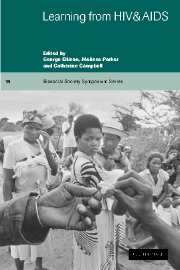Book contents
- Frontmatter
- Contents
- List of contributors
- Foreword by D. Clarke-Patel
- 1 Introduction. Learning from HIV and AIDS: from multidisciplinary to interdisciplinarity
- 2 HIV and the evolution of infectious diseases
- 3 The epidemiology of HIV/AIDS: contributions to infectious disease epidemiology
- 4 The influence of HIV/AIDS on demography and demographic research
- 5 What have clinicians learnt from working with HIV/AIDS? A medical perspective from London
- 6 How has the HIV/AIDS pandemic contributed to our understanding of behaviour change and health promotion?
- 7 Anthropological reflections on HIV prevention strategies: the case for targeting London's backrooms
- 8 An absence of anthropology: critical reflections on anthropology and AIDS policy and practice in Africa
- 9 A disaster with no name: the HIV/AIDS pandemic and the limits of governance
- 10 Postscript: reflections on HIV/AIDS and history
- Country index
- Subject index
- References
10 - Postscript: reflections on HIV/AIDS and history
Published online by Cambridge University Press: 14 January 2010
- Frontmatter
- Contents
- List of contributors
- Foreword by D. Clarke-Patel
- 1 Introduction. Learning from HIV and AIDS: from multidisciplinary to interdisciplinarity
- 2 HIV and the evolution of infectious diseases
- 3 The epidemiology of HIV/AIDS: contributions to infectious disease epidemiology
- 4 The influence of HIV/AIDS on demography and demographic research
- 5 What have clinicians learnt from working with HIV/AIDS? A medical perspective from London
- 6 How has the HIV/AIDS pandemic contributed to our understanding of behaviour change and health promotion?
- 7 Anthropological reflections on HIV prevention strategies: the case for targeting London's backrooms
- 8 An absence of anthropology: critical reflections on anthropology and AIDS policy and practice in Africa
- 9 A disaster with no name: the HIV/AIDS pandemic and the limits of governance
- 10 Postscript: reflections on HIV/AIDS and history
- Country index
- Subject index
- References
Summary
Some 10 years ago, the British medical historian Virginia Berridge (1992a: 326), strikingly declared: ‘History and historians have had a significant role in interpreting the AIDS epidemic … History, in some national responses to AIDS, became a direct policy-relevant science.’ At the outset, she argued, history was used in two ways: as a form of background knowledge; and as ‘“historical partisanship”, the use of historical example to advance particular policy positions’ (Berridge, 1992a: 326). It entered the policy debate directly and, at least in the UK, ensured a liberal non-punitive approach to people with HIV/AIDS. Analysing the chapters in the pioneering volume edited by Elizabeth Fee and Daniel Fox (1989) she showed how, in the early days of the disease, the presence of historians at international conferences was assiduously courted in the United States and the UK. They were called on to deal with earlier public health and popular responses to the spread of infectious (especially sexually transmitted) disease – quarantine and compulsory vaccination – all of which had relevance to the contemporary debate. Even more surprisingly, she maintained, leading medical authorities (notably Sir Donald Acheson, Chief Medical Officer at the Department of Health, and Michael Adler at the Middlesex Hospital) had themselves drawn direct analogies with the past and addressed historical precedents in their advocacy of a liberal public health policy (Berridge, 1992b; see also: Berridge, 1992a; Berridge and Strong, 1993; Berridge, 1996).
- Type
- Chapter
- Information
- Learning from HIV and AIDS , pp. 268 - 292Publisher: Cambridge University PressPrint publication year: 2003
References
- 1
- Cited by

